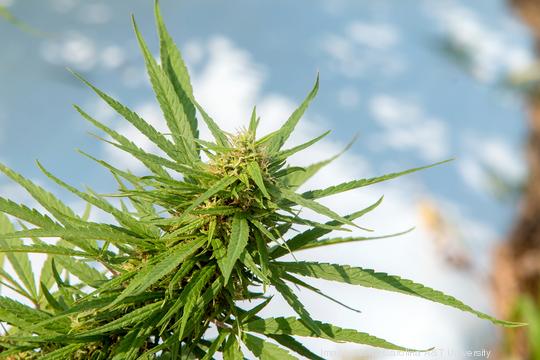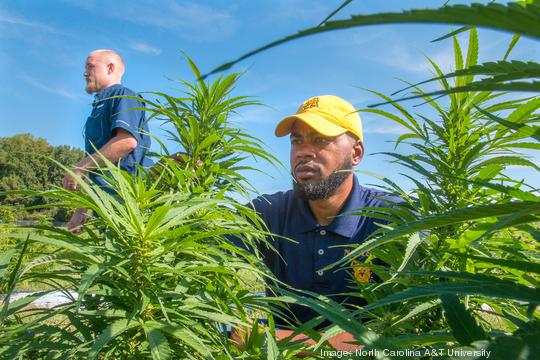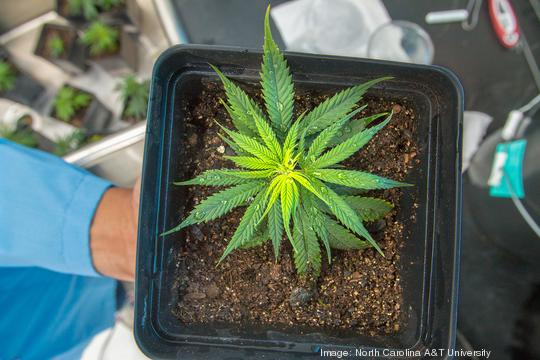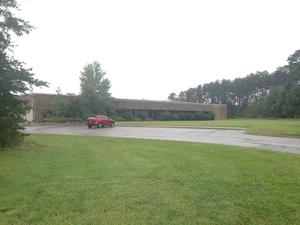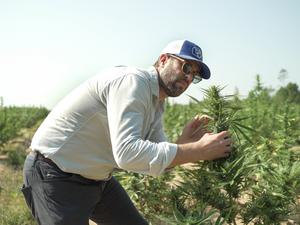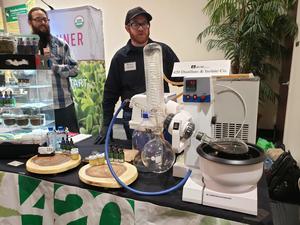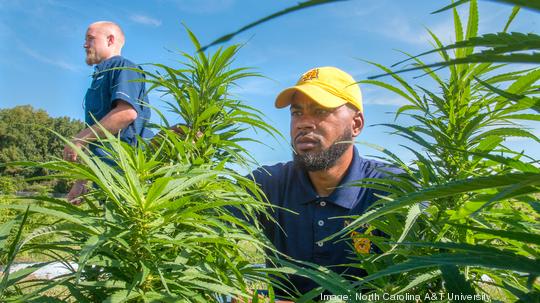
It wasn’t long after the U.S. government paved the way for industrial hemp cultivation via the 2014 Farm Bill that farmers in North Carolina and other states, viewing it as a certain cash crop, began planting in anticipation of a sellers’ market.
Greensboro attorney Robert Crumley positioned himself as one of the buyers when he founded Founders Hemp in 2017 with a plan to extract CBD for wellness products to be sold in a chain of Everything Hemp stores. After an investment of more than $1.2 million in an Asheboro facility and state-of-the-art extraction equipment there, he waited for the state and federal hemp industry regulations that never came, at least not in time.
Unable to compete in price in an unregulated extraction market, Crumley was forced to close his extraction facility, sell off the assets, close his stores and migrate to an online retail model under the name of Founders Wellness.
"I could not compete with the guy who is doing it in his in his garage or in his basement or in his bathtub," Crumley said. "Until government steps in and gets rid of the bad actors, it's just unbelievable the product being manufactured in North Carolina and other states that is being sold on the open market. That's kind of where we are."
Hemp at North Carolina A&T
In the regulatory vacuum, though, some companies are stepping up to meet a growing demand for the versatile plant that can be grown for therapeutic, protein, fiber and to make rope, textiles, clothing, shoes, food, paper, bioplastics, insulation and biofuel, to name a few.With a growing presence in the Triad, companies like Hem Mills and Ecofibre are guiding the process from farm to factory.
Regulatory 'hiccups'
Virtually banned by the Controlled Substances Act of 1970 because of its similarity to its identical cousin, marijuana, hemp had been strictly regulated in the U.S. since 1937. Consequently, when the path was cleared for cultivation in 2014, followed by the removal of hemp seeds from the Drug Enforcement Administration’s schedule of controlled substances via the Agriculture Improvement Act of 2018, companies in position to make hemp products lagged behind eager cultivation yield as public knowledge of the plant and its wide range of benefits was limited.
In the early days, that left crops to rot in the field as the industry in its infancy had yet learned to crawl, much less walk.
“Initially the CBD market was sort of non-existent, so everybody was growing for grain and fiber,” said Paul Adams, industrial hemp program manager for the N.C. Department of Agriculture.
That changed in 2018 when the Agriculture Improvement Act permitted movement of hemp material between states.
“When that happened, it really changed the dynamic and we pretty much did a complete 180, with 95% growing for CBD, although the amount of interest in hemp for industrial products you can make with fiber, as well as traditional textiles, is becoming a bigger focus,” Adams said. “Now I think we're also seeing interest in the grain market. Ultimately a diversification of hemp products and people growing for those different products and supply chains will help recover prices and make hemp more accessible.”
While the data collection from 2020 is incomplete, Adams said some 14,000 acres of North Carolina farmland was licensed for hemp cultivation, adding he expects less than 50% of that acreage was actually planted.
As USDA-guided state regulations are eventually implemented, Adams expects the maturity of the still-fledgling hemp industry will yield dividends.
“I do expect it to be more profitable in the long run,” Adams said. “Like with any new industry, there are some hiccups.”
Foundering amid regulatory void
Among those frustrated by those hiccups was Crumley, well known locally as the founder of the Crumley & Associates law firm (now Crumley Roberts) and who in 2008 ran as the GOP candidate for state attorney. Based in Asheboro, the company extracted CBD from hemp flowers for products such as topical solutions, oils, lotions, capsules and smokeable hemp sold at the company’s Everything Hemp stores in the Triad. Crumley shut down the operations and closed the stores amid Covid-19 in 2020, though his online store, shopfounders.com, remains open offering hemp-based wellness and other products.
Crumley blames the fate of Founders Hemp on USDA’s delays in crafting regulations on CBD extraction, and the state of North Carolina for waiting on the federal agency’s guidance rather than moving forward with its own, as some other states have done. His investment in the proper equipment and techniques, he said, prohibited the company from being price competitive with others that extract CBD in makeshift facilities.
“The lack of state and federal regulation to weed out the bad actors has decimated this industry,” Crumley said. “It will continue to decimate this industry until the state of North Carolina decides that it's going to regulate it. I have visited counties in the state where one was extracting in an auto repair garage. They had a homemade extraction system and they were doing it there. I had a guy come to my office who was converting an old chicken house into an extraction facility. These places out there (are) putting out products and selling them cheap because of an oversupply by farmers and a lack of regulation.”
North Carolina A&T University Farm Superintendent Leon Moses laments the absence of adequate research dedicated to modern hemp cultivation and production prior to the start of the pilot program. The school offers an industrial hemp program, providing instruction and conducting research on floral hemp cultivation at the university’s farm.
“One of the things that should have happened early on is to give the ag universities in each state the freedom and the funding to study this product for a five-year period and then provide a stable crop that speaks to the herbicides you can use, the best fertilizers to use and the best way to market and process the products around the crop,” Moses said. “That would have helped the farmers know exactly how to grow it, how to market it and how to manage it. Right now farmers are learning as they go, just like we are.”
Renewed emphasis on fiber
While USDA guidelines, which are due by the end of the year, may address the CBD extraction irregularities in North Carolina, private industry is in the process of reviving hemp cultivation for fiber, and it will have a direct impact on the Triad.
In September 2020, Australia-based Ecofibre — with its U.S. headquarters in Georgetown, Kentucky — acquired TexInnovate of Greensboro for $42 million, plus $6.6 million for two industrial facilities the company owned. The former TexInnovate is now Hemp Black, one of four businesses under the Ecofibre umbrella, all specializing in hemp-based and hemp-infused products from wellness to industrial to high-tech applications.
Ecofibre products
Ecofibre, which bills itself as a biotechnology company, is bullish on the future of hemp in North Carolina and the Triad, so much so that Managing Director Eric Wang told Triad Business Journal it has contracted with a farmer in the region to plant 14 tons of its proprietary hemp seeds.
“We have three very strong investment theses,” Wang said. “One is we do believe that natural health will have more prominence going forward, and CBD has an important role to play in that. Number two is we believe plant-based diets will increase in prominence over time, and the hemp seed is one of the highest quality plant-based proteins available. And number three, we believe sustainability is a non-negotiable for manufacturers going forward. Consumers are happy to support sustainability, but they don't want to give up performance or quality. That's what Hemp Black is about, creating much more sustainable, high-performance inputs that can compete with silver, copper and chemicals.”
Ecofibre will soon be joined in the Triad by Hem Mills, a maker of hemp-based textiles that by this fall will move to an 80,000-square-foot facility in Burlington from its 15,000-square-foot plant in Concord. The company is investing $20 million in its growth plans, which includes vertical integration to work directly with farmers to plant hemp fiber.
Like Ecofibre, Hem Mills CEO Madison Sexton said greater control of raw materials from farm to factory is necessary for the overall success of the hemp industry.
“The network right now is just really scattered, and to be able to pull this off and create a yarn that can go out to global industries, we had to take the next step and go vertical and really be involved on the farming side,” Sexton said. “What genetics to use, how to farm it, how to bail it, what type of baler to use, what type of harvesting equipment to use — we really have to be involved from the bottom up in order to pull this off.”
HEMP PRIMER
Floral vs. fiber
There are two distinct categories of hemp, and they require growing methods unique to one another.
For florals, hemp is grown like a boxwood or other small shrub. Seeds from hemp flowers can be processed into CBD products, foods and beverages as a high source of protein and iron. In order to maintain a federal government-mandated THC level of 0.3% or less, it requires a controlled growing environment, typically greenhouses, which are prevalent in northeast North Carolina.
Hemp for fiber more resembles bamboo, planted densely and grown vertically. It won’t flower and can be harvested with traditional farming equipment but requires precise retting, a process by which it is dampened or soaked to separate fibers. Careful methods are required to maintain viability, and hemp requires quick delivery to processors. Hemp fiber can be incorporated into fabrics, building materials, papers, plastics, biofuels, composite materials and more.
Yield rates
• According to the Agricultural Marketing Resource Center, one acre can host 400,000 industrial hemp plants with an average yield of 700 pounds of grain, which in turn can be pressed into about 22 gallons of oil and 530 pounds of meal. After harvesting the plant tops for grain, stalks can produce an average of 5,300 pounds of straw, which can be transformed into approximately 1,300 pounds of fiber.
• According to North Carolina State University research, 1,550 plants per acre is optimal for growing floral hemp in the state. The average yield per plant is one pound of bud, or 1,550 pounds of marketable product, per acre.
